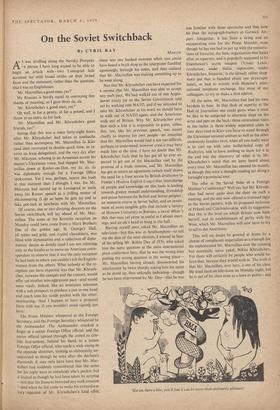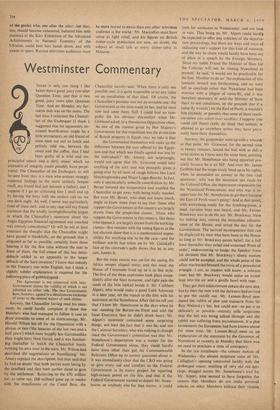On the Soviet Switchback
By CYRIL RAY Moscow
As I was strolling along the Nevsky Prospekt
A
phrase I have long waited to be able to begin an article with—two Leningrad lads accosted me with broad smiles on their broad faces and the statement, rather than the question, that I was an Englishman.
My Russian is hardly equal to conveying fine shades of meaning, so I gave them du, du.
`Mr. Khrushchev a good man, yes?'
Oh well, in for a penny, in for a pound, and I threw in an extra da for luck.
'Mr. Macmillan and Mr. Khrushchev good friends, yes?'
Seeing that this was a mere forty-eight hours after Mr. Khrushchev had taken to toothache rather than accompany Mr. Macmillan to Kiev (and then recovered in double-quick time, to re- ceive an Iraqi delegation), and the very day after Mr. Mikoyan, echoing in an Armenian accent his master's Ukrainian voice, had slapped Mr. Mac- millan down at Rostov-on-Don, my du, du, du was diplomatic enough for a Foreign Office spokesman. Yet I was, perhaps, nearer the truth at that moment than I thought I was, for Mr. Mikoyan had turned up in Leningrad to smile away his Rostov speech as a trifling matter of electioneering (I do so hope he gets in) and to take pot-luck at luncheon with Mr. Macmillan.
Of course, one or two dizzying descents on the Soviet switchback still lay ahead of Mr. Mac- millan. The scene at the Kremlin reception on .Monday could have come from a Marx Brothers film of the golden age. St. George's Hall, all white and gold, and crystal chandeliers, was filled with diplomatists and a collection of diplo- matists' dames so dowdy (and I am not referring only to the locals) as to move an American corre- spondent to observe that it was the only reception he had been to where you couldn't tell the English- women from the others. What nobody at the re- ception can have expected was that Mr. Khrush- chev, between the canapes and the concert, would offer yet another non-aggression pact—and would seem ready, indeed, like an insurance salesman with a soft prospect, to produce a pen in one hand and reach into, his inside pock'et with the other, murmuring, 'And I happen to have a proposal form with me, if you wouldn't mind signinb just here.' there was one hushed moment when you could have heard a brick drop as the interpreter fumbled agonisingly through his notes, and then realised that Mr. Macmillan was making something up as he went along.
Not that Mr. Khrushchev can have expected for a second that Mr. Macmillan was able to accept any such pact. We had walked out of one Anglo- Soviet treaty (or so the Soviet Government told us) by walking into NATO, and if we intended to take Mr. Khrushchev at his word we should have to walk out of NATO again, and the Americans walk out of Britain. Why Mr. Khrushchev ever flew such a kite it is impossible to guess, unless this, too, like his previous speech, was meant chiefly to impress his- own people—an intention that Mr. Macmillan would find it not too difficult, perhaps, to understand, however cross it may have made him at the time. I have no doubt that Mr. Khrushchev feels that he has got all he ever ex- pected to get out of the Macmillan visit by the promise of a trade mission, and Mr. Macmillan has got in return an agreement (which itself shows the need for a freer access by British draftsmen to Fowler's Modern English Usage) that 'interchange of people and knowledge on this basis is leading towards greater mutual understanding, friendship and peace between the British and Soviet peoples'; an intensive course in Soviet ballet; and an assort- ment of more tangible gifts that include a history of Moscow University in Russian, a naval officer's dirk that may yet come in useful at Cabinet meet- ings, and an elk's head to hang in the hall.
Having myself once asked Mr. Macmillan on television—but this was in Southampton—to tell me the date of the next election, I winced to hear of his telling Mr. Robin Day of ITN, who asked him• the same question at the mass international press conference here, that he was the wrong man putting the wrong question in the wrong place— Mr. Macmillan having already disconcerted his interlocutor by twice sharply asking him his name as he stood up, thus unkindly indicating—though he has been interviewed by Mr. Day—that he was The Prime Minister whispered to the Foreign Secretary, and the Foreign Secretary whispered to the Ambassador. The Ambassador crooked a finger at a senior Foreign Office official, and the senior official tiptoed through the crowd to con- fide instructions, behind his hand, to a junior Foreign Office official, who made a wide sweep in the opposite direction, looking as elaborately un- concerned as though he were after the duchess's diamonds. It may only have been that Mr. Mac- millan had suddenly remembered that the notes for his reply were in somebody else's pocket, but it looked as though he had been taken by surprise —not that his features betrayed any such emotion —and when he did come to make his circumlocu- tory rejection or Mr. Khrushchev's kind offer, less familiar with those spectacles and that bow tie than the autograph-hunters at Gatwick Air- port. Altogether, it has been a tiring and an exasperating time for the Prime Minister, even though he has not had to put up with the ministra- tions of Intourist, the State organisation that looks after us reporters, and is popularly supposed to be Eisenhower's secret weapon ('Under Lenin, revolution; under Stalin, repression; under Khrushchev, Intourist,' is the already rather shop- worn jest that is bandied about our skyscraper hotel), or had to wrestle with Moscow's inter- national telephone exchange, like most of my colleagues, to try to make a first edition.
All the same, Mr. Macmillan had had his own burdens to bear. In that flash of asperity at the Hall of Journalists one could guess what it must be like to be subjected to alternate slaps on the wrist and pats on the back; three ceremonial visits to the ballet in three widely separated cities in four days (and in Kiev you have to stand through the Ukrainian national anthem as well as the other excessively familiar two), when all you really want is to curl up with your bullet-holed copy of iEschylus; and to have nothing to show for it at the end but the discovery of what is in Mr. Khrushchev's mind that we have heard about every time Mr. Macmillan has opened his mouth, as though this were a thought-reading act doing a fortnight's provincial tour.
The offer in the. Soviet Note of a Foreign • Minister's Conference? Well yes, but Mr. Khrush- chev had never quite shut the door on such a meeting, and the one now offered is trimmed tight to the Soviet pattern, with its proposed inclusion of Poland and Czechoslovakia, with its suggestion that this is the level on which Britain' now finds herself, and its establishment of parity with the West, which Mr. Macmillan will now have to try to sell to the Americans.
This will no doubt be greeted at home by a chorus of complacent imperialists as a triumph for the sophisticated Mr. Macmillan over the cunning but essentially naive yokel, Nikita Khrushchev. For there will certainly be people who would be- lieve that, because they would wish to. The truth is that Mr. Macmillan, over here, is out of his class. He tried hard on television on Monday night, but he is out of his class even as a bore in public : any
*Go on, have a bite, you'll find it can be inure than ordinarily pleasant'
of the guides who, one after the other, lest they, too, should become exhausted, battered him with statistics at the Kiev Exhibition of the Advanced Achievements in National Economy of the Ukraine, could beat him hands down, and with yawns to spare. Russian television audiences must be more inured to ennui than any other television audience in the world: gr. Macmillan must have come 'as light relief, and his figures on British motor-cycle production are now, no doubt, the subject of small talk at every dinner-table in Moscow.



































 Previous page
Previous page